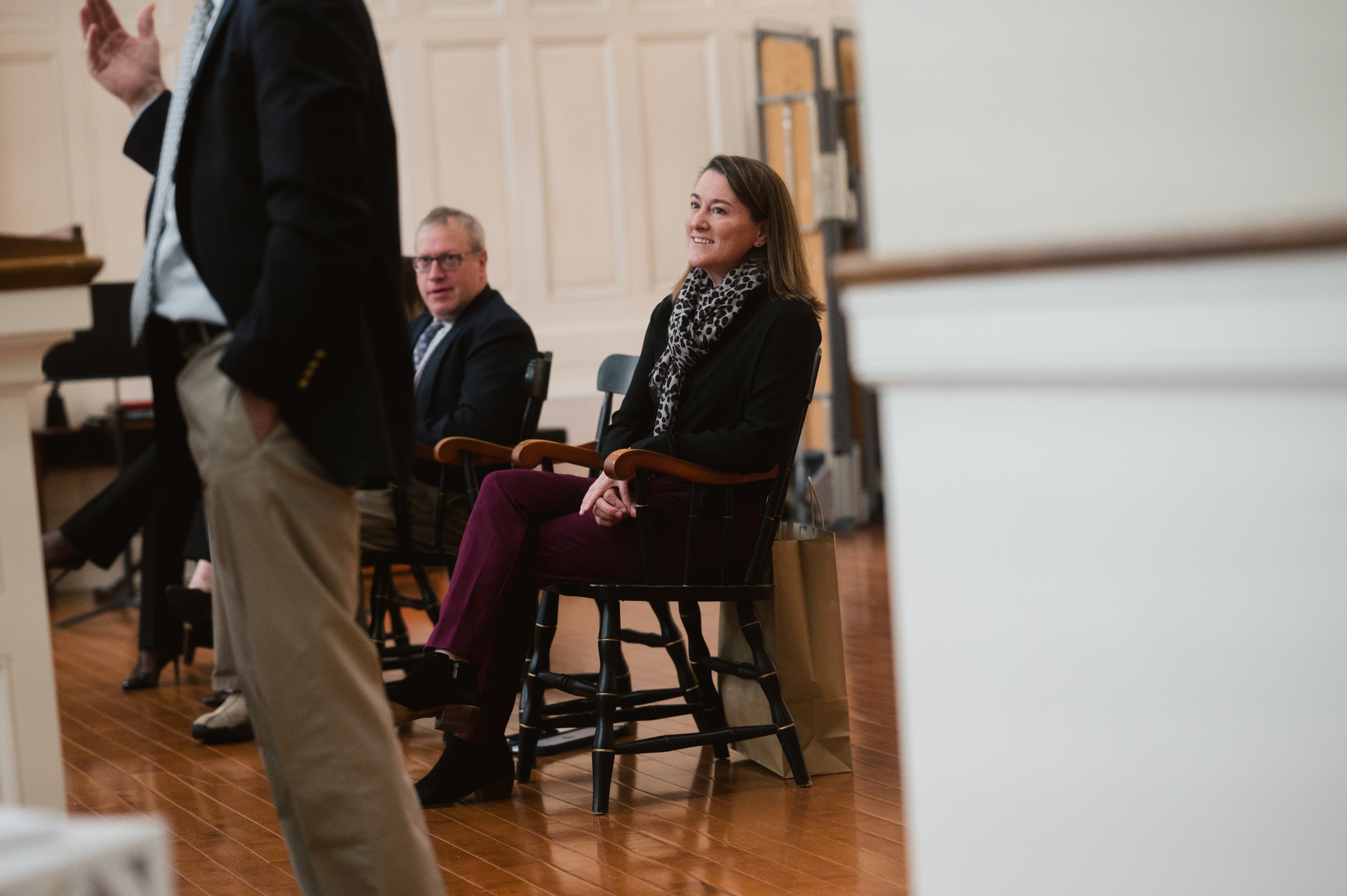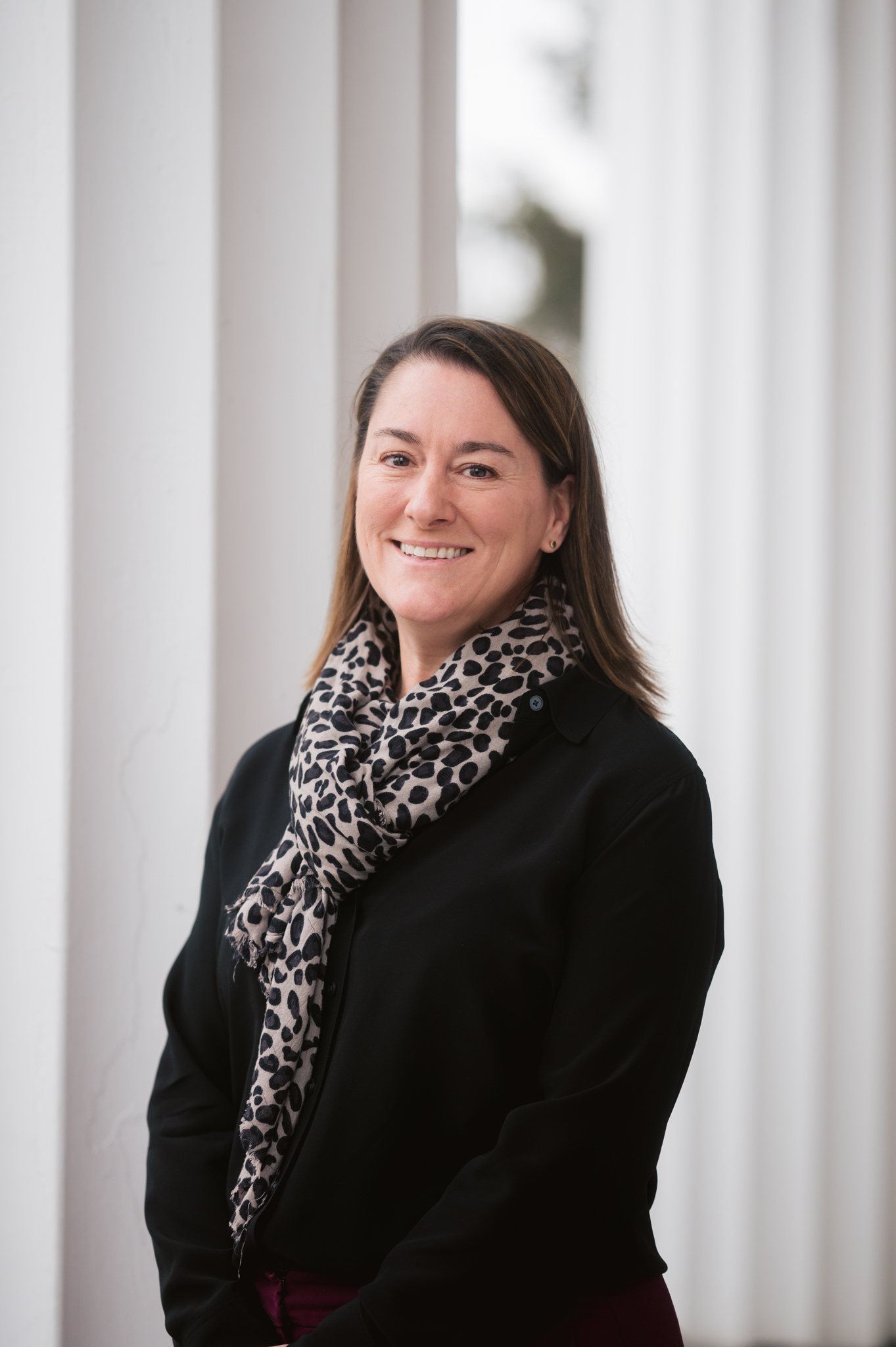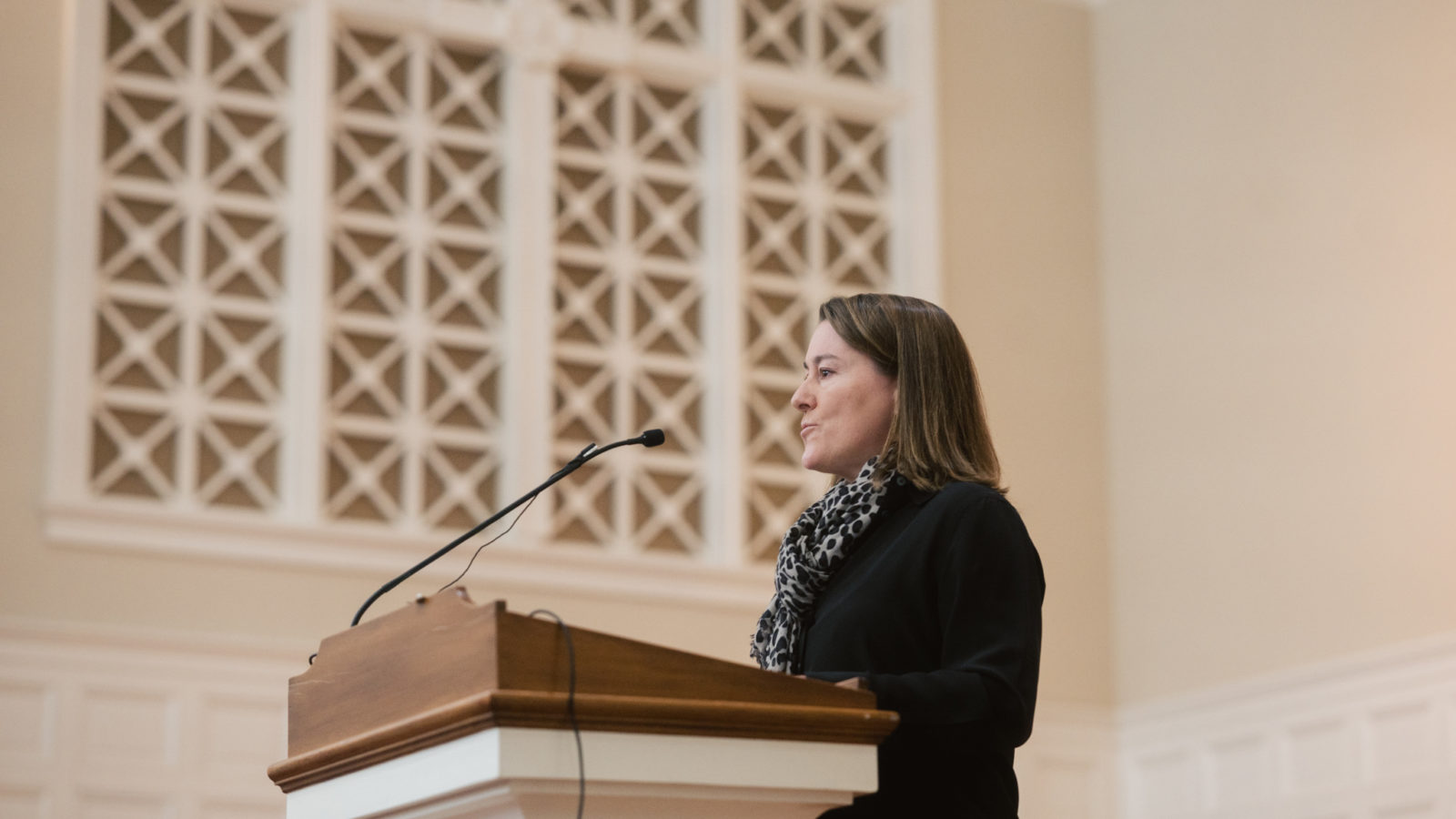Samantha (Healy) Vardaman ’89 returned to campus Friday to address the newest class of the school’s Cum Laude Society. Vardaman spoke to the 12 new members and the rest of the gathered assembly about how she went from a seat in the Chapel’s pews to a career of public service.
Vardaman recently transitioned into fundraising and development for The Madeira School, an all-girls private school in Virginia, after completing a 17-year career running the Institute for Justice & Advocacy of Shared Hope International, which works to prevent child sex trafficking and restore and bring justice for survivors. For Head of School Robert W. Hill III, Vardaman’s invitation back to campus continued his goal of bringing back alumni that are dedicated to helping others.
“This year, my goal was to have alumni return who share a common thread of meaningful service to someone, some institution, or some goal beyond themselves,” Hill said, before adding shortly after that Vardaman “dedicated a major portion of her professional career to the welfare of the most vulnerable.”

Previously, Samantha worked at the American Bar Association where she directed the rule of law program in Moldova, an Eastern European country struggling to overcome the legacy of Soviet control. She is a graduate of Boston College and the University of Miami School of Law.
Below are her remarks in full. To watch a video of the speech, click here:
“Good morning!
“It seems not so long ago that I was sitting in the 4th row there!
“Congratulations to the new members of the Cum Laude Society! It is a terrific honor and achievement.
“The skills and discipline you are learning at Williston will serve you all very well in the world. As I reflect on the key events that led me down some of the more interesting paths over the years, I find one that happened right here in this assembly.
“My senior year, an alum working as a diplomat with the State Department came to speak to us about his experiences. I remember first thinking he was rather young to be doing such an exciting job. Maybe I could do this too! Then I remember thinking he was probably fluent in multiple languages, with an Ivy League degree. But no! He was not multilingual, and he did not graduate from an Ivy League school (though he did return for a master’s degree at Georgetown University, leading me to apply there for undergrad, but alas not accepted). Here is what he said: it takes courage.
“With encouragement from my advisor Cathleen Robinson and the amazing faculty at Williston, and later in college and law school….I pursued my interest in international affairs that started right here.
“Years later, I realized my goal of living and working internationally. I completed law school and was working in a law firm when I realized there was something else I was meant to do!
“I applied to work with the American Bar Association Central European and Eurasian Law Initiative implementing an ambitious rule of law program in the former Soviet Union aiming to replace the old legal system with a modern one.
“I am sure you know that the Soviet Union began its spectacular collapse in 1989, finally dissolving in 1991. The tragic consequences of that regime included a dysfunctional, inaccessible and outdated legal system. Millions of people in dozens of new independent states had their rights stripped, their land seized, their families splintered – they needed lawyers and functioning courts to restore them.
“Also, law schools needed to be overhauled and modernized. Law clinics were a way to accomplish both needs, and a primary feature of the rule of law program was to establish law clinics.
“In the first year of starting a law clinic with a university in the north, over 30 people were helped to reclaim their passports and other official documents taken from them by traffickers when they were trafficked abroad for labor and sexual exploitation. The fact they had found their way home was a miracle, but their lives were in tatters. Moldova was one of the hardest hit by trafficking in persons of all the new independent states.
“Children were left behind with grandparents while young parents went to look for work abroad, hoping their opportunity was legitimate and not a trick. Some parents did not come back. Grandparents needed legal custody and support to raise these children. Young mothers and fathers left behind needed to sell houses, get remarried, access joint funds… all of this required legal help. And better laws. And this was just the ripple effects of human trafficking.
“A curious case we helped file with the European Court of Human Rights involved the restricted access of farmers to their own land each day because it lay on the other side of the border with the unrecognized breakaway republic of Transnistria. The case was resolved in favor of the farmers, but the problem continues.
“During my time living in Moldova, I also had the incredible honor of participating in election monitoring during the Orange Revolution in Ukraine and Moldova’s own nascent attempt at a “color revolution” as they came to be called.
“Toc Yushchenko! was heard on the streets of Kyiv in the fall of 2004 as the people protested corruption and tried to bring in a western leaning leader. As one of the many election monitoring teams traveling around the country that cold winter, my friend and I found ourselves bundled into unheated public buildings to watch the count of ballots. The most interesting was the voting taking place late in the night within the large prison outside of Kyiv. Shivering in our LL Bean down parkas, we were escorted by heavily armed and masked guards for our safety and sat for several hours as hundreds of prisoners were paraded through to vote. No inconsistencies were observed.
“Along the way, I was able to live a totally different way, learn new languages, try new foods, make new friends and family (I have a goddaughter in the Netherlands and a godson in Moldova!), … In 3 years I traveled in Russia, Belarus, Uzbekistan, Serbia, Ukraine, Poland, Turkey, Jordan, Cyprus, Egypt, Czech Republic, Hungary, the Netherlands, Austria, and of course throughout my homebase of Moldova.
“At the time, America was leading the Coalition Provisional Authority in Iraq. Without getting into the details of that, which I will leave to your history teachers, the impact was felt everywhere I traveled. And the fear. Fear of us, fear of them, fear of the unknown.
“And I remembered the words of the foreign service officer who spoke at my senior assembly: it takes courage. The kind of courage that draws on inner strength, sound judgment, and a little bravery.
“I realized then that courage is not always a response to our own fear. It can also be a response to others’ fear. People were afraid of me – maybe because I am American, or I am a woman, or I am a lawyer, or I am a stranger, or some other reason — and I needed courage to put myself out there despite that.
“To persist in growing beyond your zip code, to explore and embrace differences, and to explore the world – it takes courage!
Today courage is needed more than ever.
“The world is polarized over so many issues, from politics to religion to health. It almost makes you want to live your life vicariously through the internet! And, you know what? Some people are. And that breeds intolerance and extremism.
“As for me, I continued to travel after returning to live in Washington, DC. I added quite a few more countries to the list of those I worked in, including Japan, Jamaica, India, Nepal, Fiji and the Northern Mariana Islands. I ran a nonprofit working to combat child sex trafficking in various countries, including the United States. I saw some things I wished I hadn’t… but I also saw things that kept me curious and motivated.
“Sometimes those two things happened at the same time: walking through the red light district of Mumbai to a worship service in the attic of an old commercial building with trafficked women and children was shocking and made me recommit to fighting slavery. Waiting in an adjoining hotel room to receive the girl being sold to undercover police in a sting in Jamaica and connect her to safety crushed and crazed me at the same time.
“Now I have two small children, and it will take a lot of courage for me to take them with me on my adventures. Logistically, and emotionally. But I will.
“And I urge you, get out there! It takes courage, but it’s worth it.”


